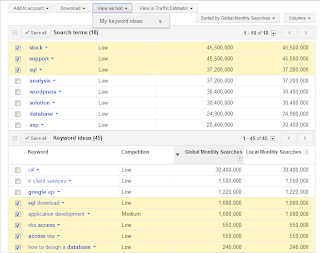Search
engine optimisation is divided into two main types, off-site and on-site. Both
are mid- to long-term strategies and are an art rather than a science. This
article focusses on one type of on-site
optimisation; keyword refinement.
What are keywords?
Primarily,
keywords are the words and phrases that your site is most likely to be found
on. Their first purpose is to be embedded in the header of your website, which
is visible to search engines rather than customers. However, modern search
engines not only search headers and visible
text but also compare them, looking
for correlations. Sites where the content matches the search terms in a natural
way tend to rank higher on search engines.
Note
that keywords are not always the terms that you might want your site to be found on. For example if you selling sports
jackets, simply using the term 'sports jackets' is probably a bad idea, as Nike and
Adidas are likely to be way ahead of you.
What makes a good search term?
The
trick here is specialisation. Rather
than have clients search on generic terms, which many people are looking for but many other
businesses are targeting, use specific language which refers to your business
in particular. Fewer people may be looking for it but it is much more likely
that they will find you rather than one of your competitors.
Have a key phrase or phrases that you
are specifically targeting. The Adwords
instructions below will help you come up with a coherent phrase that your
customers may well be searching for, that addresses their particular needs. A good
phrase might be one of your core services, combined with a one or two word
summary of your USP or location. Mine is 'convert access databases edinburgh
Incorporate a unique selling point
into your search terms. A USP helps
to differentiate you from other similar businesses. This is more important than
ever on the internet, where clients have access to potentially thousands of
competitors. Remember that this competition is distributed globally and this
may not be useful to all customers. Therefore, for more local businesses, your
geographical position can be a useful way of distinguishing yourself.
Consider addressing a need rather
than providing a solution. This addresses the 'benefits vs. features'
approach to marketing. You know that you sell excellent quality sports jackets.
The customer knows that they are cold or that they need a fashion item for the
new season. Make sure that your keywords and content match your customers' requirements.
Be brief. The average user types in four or less words into a
search engine for each query. Any phrases you use that are longer than that are
probably wasted.
How to use Google Adwords to refine
your Search Terms
- Create a Gmail
account, if you don't already have one. Google requires you to have a
profile with them in order to use their internet tools.
- Go to
http://adwords.google.com
- On the top menu bar,
click on Tools and Analysis / Keyword Tool.
- In the 'Word or
phrase' box, type in the terms that you want your site to be found
on. Bear in mind that some phrases will have heavy competition and not all
phrases will be as sought after as you might think. The best option is to
aim for the 'low hanging fruit', ie. the terms with low competition but
high search frequencies.
Ten or fifteen search terms is a reasonable amount. Remember that each separate word or phrase should be on a new line. - Click on 'Search'. Click
on the 'Keyword ideas' above the 'Search terms' box. Scroll down to the
'Keyword ideas' results box below.
- Click on the '
Global Monthly Searches' heading to sort
by the most frequently sought after terms. Do this for both the 'Search
terms' and 'Keyword ideas' results. Disregard any results that have less
than a million searches.
- Look down the 'Competition'
column. Competition is divided into three categories, 'High', 'Medium' and
'Low'. Ideally, you want all of your keywords to have 'Low' competition
but this may not always be practical.
- Using the checkboxes
on the left, select the relevant keywords, with the most searches and the
lowest competition, from both the 'Search terms' and 'Keyword ideas'
results. Click on the 'View as text' / 'My keyword ideas' option, above
the 'Search terms' result set. This will bring up a list of your refined
keywords. You can now stop here or use these terms to repeat the process
and refine them further.

How to use Keywords
As
mentioned above, the first thing to do with your refined keyword list is to
make sure that it is embedded in the header of your web page or blog. It should
be in the following format:
<meta name="keywords" content="[Comma separated list of keywords and
phrases]">
Each
page of your site should contain this element and there should be only one list
per page. It is also good SEO practice to use these words and phrases in the
title and content of your pages, in an organic fashion, especially in the headings and links. It is
also a good idea to vary your keywords between pages, in order to relate
better to each page's content, while keeping an overall theme.
Download the How To Generate Search Engine Keywords using Google Adwords article as a printable PDF file.
Download the How To Generate Search Engine Keywords using Google Adwords article as a printable PDF file.


ReplyDeleteSearch Engine Optimisation not only promotes your website, it also increases its visibility. Search engine optimisation is important if you want your web presence to be solid. In case you have missed the opportunity to optimise your website, it’s about time you should. Once your website is optimised, you will enjoy the manifold benefits of SEO.